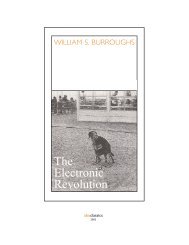Franco ''Bifo'' Berardi - The Soul at Work From Alienation to Autonomy
Franco ''Bifo'' Berardi - The Soul at Work From Alienation to Autonomy
Franco ''Bifo'' Berardi - The Soul at Work From Alienation to Autonomy
You also want an ePaper? Increase the reach of your titles
YUMPU automatically turns print PDFs into web optimized ePapers that Google loves.
78 1 <strong>The</strong> <strong>Soul</strong> <strong>at</strong> <strong>Work</strong><br />
their labor <strong>to</strong> the cre<strong>at</strong>ion implied by the word enterprise: on the<br />
contrary, they tend <strong>to</strong> consider their labor, even if formally depen_<br />
dent, <strong>to</strong> be an enterprise where they can spend the best part of their<br />
energy, independently from the economic and juridical condition<br />
in which it expresses itself.<br />
In order <strong>to</strong> understand this mut<strong>at</strong>ion in the perception of the<br />
notion of enterprise, we need <strong>to</strong> consider a decisive fac<strong>to</strong>r: while<br />
industrial workers invested mechanical energies in their wageearning<br />
services according <strong>to</strong> a depersonalized model of repetition,<br />
high tech workers invest their specific competences, their cre<strong>at</strong>ive,<br />
innov<strong>at</strong>ive and communic<strong>at</strong>ive energies in the labor process; th<strong>at</strong><br />
is, the best part of their intellectual capacities. As a consequence,<br />
enterprise (independently from the juridical rel<strong>at</strong>ion between property<br />
and labor) tends <strong>to</strong> become the center <strong>to</strong>wards which desire is<br />
focused, the object of an investment th<strong>at</strong> is not only economical<br />
but also psychological. Only if we consider this can we understand<br />
why in the last two decades disaffection and absenteeism have<br />
become a marginal phenomenon, while they had been the central<br />
element in social rel<strong>at</strong>ions during the l<strong>at</strong>e-industrial period.<br />
In the 1980s (and even more, as we know, in the 1990s) the<br />
average labor time increased impressively. In the year 1996, the<br />
average worker invested in it 148 hours more than their colleagues<br />
did in 1973. According <strong>to</strong> the US Bureau of Labor St<strong>at</strong>istics the<br />
percentage of individuals working more than 49 hours per week<br />
grew from 13% in 1976 <strong>to</strong> 19% in 1998. As for managers, it grew<br />
from 40% <strong>to</strong> 45%. <strong>The</strong> prevision th<strong>at</strong> the development of computerized<br />
technologies, favoring au<strong>to</strong>m<strong>at</strong>ion, would determine a<br />
reduction of social labor time proved both true and false, but in the<br />
flnal analysis we have <strong>to</strong> consider it false. It is true indeed th<strong>at</strong><br />
necessary labor time decreases in the sphere of industrial production,<br />
and therefore it is true th<strong>at</strong> a growing number of industrial jobs are<br />
.<br />
I. ted replaced by machines or transferred <strong>to</strong> areas of the world<br />
e trntna J<br />
where labor costs nothing and is not protected by unions. But it is<br />
also true th<strong>at</strong> the time apparendy freed by technology is in fact<br />
transro rmed in<strong>to</strong> cyber time, a time of mental processing absorbed<br />
in<strong>to</strong> the infinite production processes of cyberspace.<br />
How is it possible <strong>to</strong> explain the workers' conversion from<br />
C<br />
disaffection <strong>to</strong> acceptance? Certainly, one of the reasons is the<br />
political defe<strong>at</strong> suffered by the working class after the end of the<br />
1970s because of the technological restructur<strong>at</strong>ion, the consequent<br />
unemployment and the violent repression inflicted on the political<br />
avant-garde. But this is not enough.<br />
In order <strong>to</strong> understand the psycho-social change of <strong>at</strong>titude<br />
<strong>to</strong>wards labor, it is necessary <strong>to</strong> consider a decisive cultural transfo<br />
rm<strong>at</strong>ion linked <strong>to</strong> the shift of the social core from the domain of<br />
manual labor <strong>to</strong> th<strong>at</strong> of cognitive labor.<br />
Wh<strong>at</strong> is happening in the domain of cognitive labor? Why does<br />
this new kind of worker value labor as the most interesting part of<br />
his or her life and therefore no longer opposes the prolong<strong>at</strong>ion of<br />
the working day but is actually ready <strong>to</strong> lengthen it out of personal<br />
choice and will?<br />
To answer this question we need <strong>to</strong> consider several fac<strong>to</strong>rs, some<br />
of which are difficult <strong>to</strong> analyze in this context. For instance in the<br />
last decades urban and social communities progressively lost their<br />
interest, as they were reduced <strong>to</strong> containers empty of humanity and<br />
joy in the rel<strong>at</strong>ions they foster. Sexuality and conviviality have been<br />
transformed in<strong>to</strong> standardized mechanisms, homolog<strong>at</strong>ed and commodified:<br />
an anxious need for identity progressively replaced the<br />
singular pleasures of the body. Books like Mike Davis' City of Quartz<br />
and Ecology of Fear show th<strong>at</strong> the quality of existence has affectively




